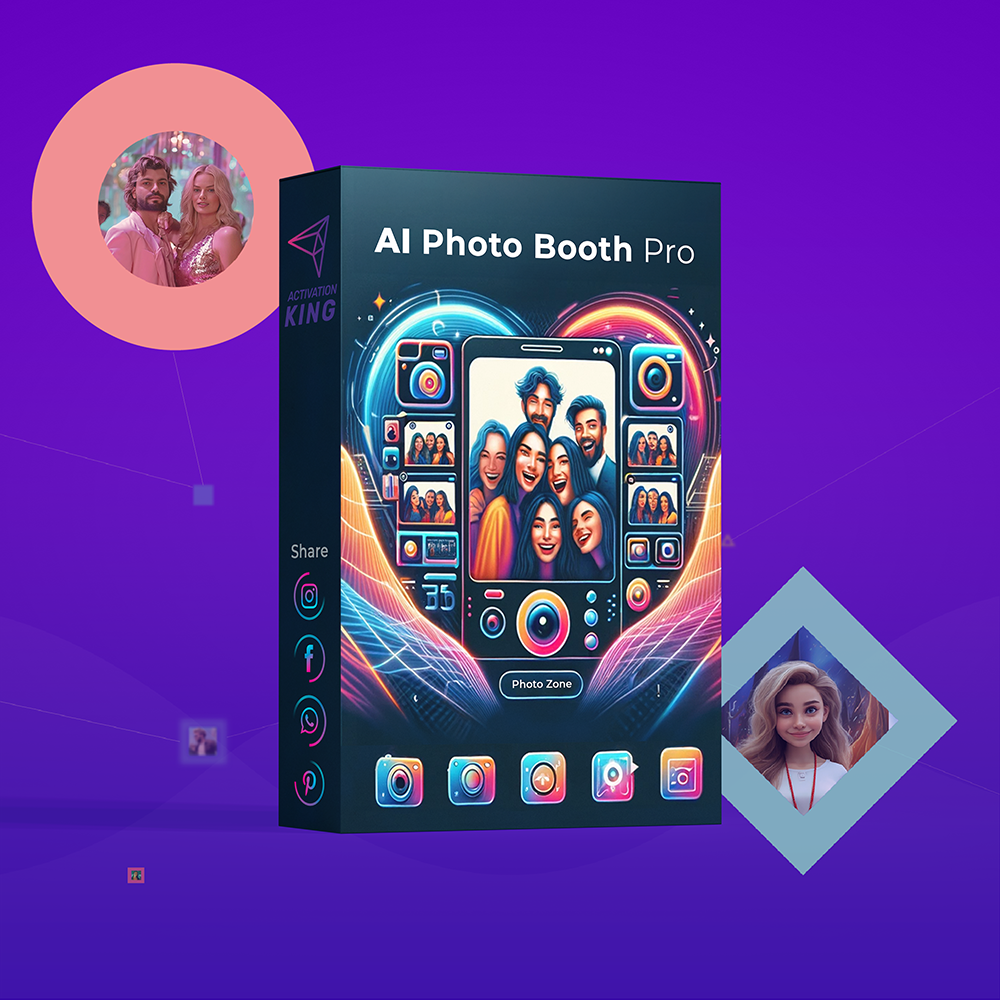One of the ways to immortalize memories in the entertainment industry today is to offer photo booth business. Photo booths, which are preferred in all kinds of organizations from weddings to birthdays, from corporate events to private parties, enable participants to experience fun and unforgettable moments and immortalize their memories.
In this guide, we will examine in detail the steps you need to take to set up your photo booth business. We will provide you with the information you need to be successful in this industry by covering each step one by one, from preparing a business plan to selecting the necessary equipment, from software installation to marketing strategies. Read on to learn the tricks of having a successful photo booth business!
Step 1: Create Your Business Plan
Before starting your own photo booth business, it is important to prepare a comprehensive business plan. This plan should include your business goals, target audience, marketing strategies, and financial projections. A business plan is a guide to help you manage your business in the right direction.
One of the important points of photo booth businesses is that they can serve such a wide range of markets. Weddings, launches, graduations, family reunions, retail and hospitality, team building events, brand activations… opportunities are everywhere. The only downside to this multitude of options is that it can be difficult to narrow down your ideal customer base.
Set Your Goals
The first step in creating a successful business plan is to determine the short- and long-term goals of your business. These goals are important milestones to measure the success of your business and help you make strategic decisions. When setting your goals, clarify the income level you aim to achieve within a certain period of time. For example, plan how much income you want to make in the first six months and how you will achieve that income. Regularly evaluate customer feedback and continuously improve your service quality to ensure high customer satisfaction.
Define Your Target Audience
By defining your target audience, you can plan your marketing and sales strategies more effectively. Set different customer profiles for different events such as weddings, birthdays, corporate events.
- Who can benefit from Photo Booth Services?
- Which markets interest you the most?
- How can you narrow down your target audience?
- Will your target audience be profitable?
- What are your competitors doing?
Adjust Your Budget
Do financial planning by calculating your business’s costs and potential revenues. Consider items such as equipment costs, software licenses and marketing expenses. Do your research on the right equipment, targeted marketing, and what type of photo booth you want. You can choose different photo booths for different events. For example, traditional Photo Booth, Mirror Booth, 360 Degree Booth, Selfie Booth etc.
Step 2: Purchase Necessary Equipment
There are actually two main pieces of equipment you need to start your Photo Booth business: a camera and a computer. A high-resolution camera allows you to take quality photos. A computer is required to process photos and run software. In addition, there are additional equipment you need to purchase. Additional equipment can make the photo booth experience more professional. Equipment such as camera stands, lighting, background and printing devices will increase your customers’ satisfaction.
General list of items you need;
- Photo Booth
- Camera
- AC adapter
- Laptop
- Touch screen monitor
- Photo booth software
- Printer
- Paper and ink for printer
- Vehicle to carry everything
Photo Booth Body
- Design and Material Selection
Aesthetics and Function: First, determine what kind of aesthetics you are looking for. Modern and stylish or retro and nostalgic?
Material: Choose durable materials such as wood, metal or plastic. Wood can give a warm and classic feel, while metal offers a more modern look. - Structure and Durability
Frame: Build the main frame of the cabinet. Metal frames are generally stronger and more durable, but wood frames can also be aesthetically pleasing.
Panels: Add panels around the frame. These panels both protect internal components and provide an aesthetic surface.
- Placement of Components
Power and Cabling: Allow space inside for power supplies and cables. It is important from an aesthetic point of view that the cables are organized and hidden.
DSLR and Lighting: Identify appropriate locations for the DSLR camera and lighting. The camera should be at face level and light sources should illuminate the user evenly. - Size and Portability
Size: Consider portability when determining the size of the cabinet. It should not be too large, but large enough to accommodate internal components.
Weight: You can increase the portability of the cabinet by using lightweight materials. At the same time, you can choose modular designs that will facilitate installation and disassembly.
Modular Design: Create a design where parts can be easily assembled and disassembled. This makes installation and transportation easier. - Security and Protection
Locking Mechanism: Add locking mechanisms for security of internal components.
Weather Resistance: For outdoor use, ensure the cabinet is water and wind resistant.
By following these steps, you can create a functional and aesthetically pleasing outdoor photo booth body. By considering your needs and user experience at every step, you can create a unique and effective product.
Step 3: Get AI Photo Booth Software
Software Features
After obtaining your equipment, you should download the AI Photo Booth software, which is the most important point of your work. This software automatically processes photos and offers a user-friendly interface. When you install the software on your computer, all settings and features are ready, allowing you to start using it immediately.
AI Photo Booth software is equipped with various features. Features like filters, effects, backgrounds and instant printing options provide your customers with an unforgettable experience. In this way, it allows you to easily do everything that all photo booths on the market can do.
Downloading and Installing the Software
It is quite simple to download the software and install it on your computer. By following the step-by-step installation guide, you can have the software ready to use in minutes.
Software Updates
Check and install updates regularly to benefit from the latest features of the software. This allows you to consistently ensure optimal performance and access new features.
Software Installation and Testing
After downloading the AI Photo Booth software and installing it on your computer, you should test all the functions of the software. Experiment with different settings to learn how they work for best results. Determine the services you will offer to your customers by examining the effects, filters and printing options provided by the software.
In this guide, we will examine in detail the steps you need to take to set up your photo booth business. We will provide you with the information you need to be successful in this industry by covering each step one by one, from preparing a business plan to selecting the necessary equipment, from software installation to marketing strategies. Read on to learn the tricks of having a successful photo booth business!
Step 4: Prepare Different Themes and Backgrounds
Prepare different themes, frames and backgrounds to give your customers a variety of options. Creating suitable themes for different organizations such as weddings, birthdays, corporate events will increase customer satisfaction. By easily integrating backgrounds into your software, you can make photos more attractive.
Theme Options
Create suitable theme options for different events. For example, you can prepare romantic themes for weddings and colorful and fun themes for birthdays. You can browse ready-made prompts or create your own prompts.
Background Designs
You can customize your background designs according to your customers’ demands. Additionally, you can create the feeling of shooting in various locations by using the virtual background options offered by the software. Thanks to these features offered by AI Photo Booth, you do not need to make extra expenses such as green screen or blue screen.
Step 5: Plan Pricing
The best way to determine your prices is to evaluate competitors’ prices. Research businesses in your area that do business with the same target audience and companies that offer similar services to a different customer. You can pay attention to the following questions when pricing:
- Who are your competitors?
Determine who your competitors are and what types of services they offer. By examining their pricing strategies, you can use them as a guide in determining your own prices. To do this, ask these questions:-What are the standard prices?
-What discounts do they offer?
-What do they offer that you cannot?
-What do you offer that they cannot?
-How is your business different from them?
-What position do they have in the industry? - What are your costs?
Calculate all your costs such as equipment, software, operating expenses and marketing expenses. Don’t forget to add your profit margin to these. - Who is your target audience?
Have information about your target audience’s budget. Determine in which price range your target audience prefers to receive services and price accordingly. - Can You Offer Different Packages / Services?
Offer a variety of packages that cater to different needs. For example, you can appeal to different budgets by creating basic, medium and premium packages.
Step 6: Develop Marketing and Promotion Strategies
Photo Booth işinizi duyurmak ve müşteri çekmek için etkili pazarlama ve tanıtım stratejileri geliştirin. İşletmenizi sosyal medyada, web sitesinde, e-posta pazarlamasında ve yerel etkinliklerde tanıtım yaparak duyurabilirsiniz. Özellikle sosyal medyada aktif olarak fotoğraf paylaşarak daha geniş bir kitleye ulaşabilirsiniz. Ancak bundan önce, işletmeniz için etkili bir şirket adı bulmalısınız. You can also find detailed information on how you can market your business here.
An Effective Name for Your Business
Choosing a new name may not be easy at all. The name you choose should be unique, meaningful and memorable. It should also be easy to write and pronounce. But most importantly, you should definitely make sure that the name is not trademarked by someone else or used by another rental company.
Social Media Usage
Social media is the perfect platform to promote your business. You can expand your follower base by sharing photos from events on popular platforms such as Instagram, Facebook and Twitter. For example, you can regularly publish your work and photos on Instagram, which is a visual-oriented platform. You can increase your reach and reach potential customers by using hashtags.
Creating a Website
A professional website reflects the seriousness and professionalism of your business. You can reach potential customers by sharing information such as your services, prices and customer references on your website.
- Services: Describe in detail all the services you offer on your website. Specify all the details such as photo booth rental, theme and background options, printing services, etc.
- Pricing: Clearly state your different service packages and prices. Make it easy for potential customers to choose the package that best suits their needs.
- Testimonials and Portfolio: Show your credibility and quality by sharing customer testimonials and photos from previous events. This will influence potential customers’ decision to work with you.
- Contact Information: Add your contact information and a contact form to your website so your customers can easily reach you.
Email Marketing
Email marketing for photo booth business is an effective way to stay in touch with your current and potential customers. You can provide information about your new services and campaigns with the newsletters you send regularly.
- Newsletter Sending: Inform your customers about your new services, special offers and events with email newsletters you send at regular intervals. This increases customer loyalty and increases the likelihood of repeat business.
- Campaign Announcements: Attract the attention of your customer base by sharing your announcements such as special discounts, seasonal campaigns or new product launches via e-mail.
- Personalized Communications: Personalization is important in email marketing. Emails you send using your customers’ names are more sincere and effective. Also make personalized recommendations based on your customers’ past purchases or interests.
Share This Post Now!
Discover the World’s Best Photo Booth Software
AI Video, AI Face Swap, AI Prompt, AI Background Removal, Photo Booth, 360 Video, Mirror Booth, Green Screen, GIF Booth, Word Portrait and GLAMBOT!






